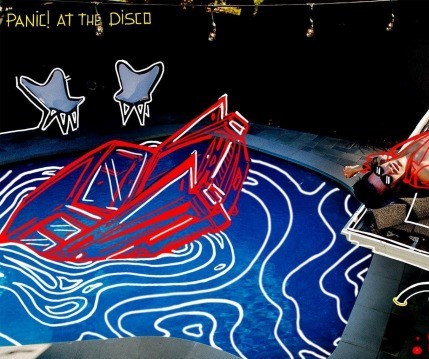Panic! at the Disco releases its fifth album, “Death of a Bachelor”
January 21, 2016
Three years have past since the release of alternative band, Panic! at the Disco’s last album, “Too Weird To Live, Too Rare To Die!” The band is back with their fifth studio album, “Death of a Bachelor,” it’s sound encompassing its classic sound, but with influences by Queen and Frank Sinatra.
After the last album was released, two of the members, Spencer Smith and Dallon Weekes, left the band, leaving the lead singer Brendon Urie as the only member left, having to pick up the band to start a brand new chapter.
“Death of a Bachelor” consists of 11 songs, all sounding different from one another. Urie co-wrote and played all of the instruments with the exception of the horns. One track gives off rock-and-roll vibes with hints of Queen, while another song gives off Michael Bublé-esque vocals paired with various horn instruments.
“Victorious” – Using drums and an electric guitar throughout, the second single released, “Victorious,” is upbeat and lively starting off the album the right way. A chorus of voices starts off the song with lyrics, “tonight we are victorious, champagne pouring over us, all my friends were glorious, tonight we are victorious,” transitioning into Urie’s operatic sounding voice. The hopeful track is made for the victories in life that are past being great at sports – it is about putting your all into everything and being victorious in other ways past orthodox reasons.
“Don’t Threaten Me With A Good Time” – The guitar riff at the beginning of “Don’t Threaten Me With A Good Time” is sampled from The B-52’s song “Rock Lobster” and reminisces of the 50s. This track is fun with an upbeat tempo, one of the more rock sounding songs from the record. Urie’s powerhouse vocals keep up with the drums and electric guitar, making it a song to dance to.
“Hallelujah”- Yet again, the track, “Questions 67 and 68” by Chicago, is sampled for the beginning of “Hallelujah” with the uses of horn instruments, trumpets and trombones. “Hallelujah” is the first single released, creating the atmosphere for the entire album. This gospel-sounding track conveys the message of taking responsibility for one’s sins and learning a lesson in order to save the future version of oneself. A choir of singers occasionally sing “hallelujah” during the chorus adding to the upbeat vibes of the song.
“Emperor’s New Clothes” – This track conveys Urie starting new, because of the departure of the last two band members; he sings lyrics, “welcome to the end of eras, ice has melted back to life, done my time and served my sentence.” In a way, this is Urie’s message to his fans and his past band members of his stance on how the band was left. The song has hints of operatic melodies creating a haunting effect.
“Death of a Bachelor” – Urie is heavily influenced by Frank Sinatra, making the sounds of the song an ode to him. “Death of a Bachelor” sounds like a serenade to his wife. It consists of clapping and snapping with the use of a mellotron throughout, including Urie showing off his vocal range with various high notes. “The death of a bachelor, seems so fitting for, happy ever after,” is a lyric that conveys the happiness and blissfulness of the track.
“Crazy=Genius” – This song’s melody is reminiscent of Benny Goodman’s “Sing Sing Sing,” using a plethora of horn instruments to create a 1920s sounding tune. The lyric, “you can set yourself on fire, but you’re never gonna burn burn burn,” is sung to represent how one can never truly shine if one is not themselves.
“LA Devotee” – A Los Angeles socialite is described in “LA Devotee,” with the song’s fast tempo keeping up with the description of the socialite. The lyric ,“and a black car that matches your blackest soul,” represents what Urie thinks of as a typical “LA Devotee” where their fancy black car is just like the recipient’s personality. This track shows what LA is like in the eyes of an elite, using minimal amounts of different instruments, mainly sticking to drums.
“Golden Days” – Urie refers to his past and present experiences with his wife as “Golden Days.” Urie sings lyrics, “time can never break your heart, but it’ll take the pain away, right now our future’s certain, I won’t let it fade away,” with echo sounds of his voice. This track is an ode to his wife, having a hint of rock melodies and tones to it.
“The Good, The Bad and The Dirty” – This track fuses bits of rock sounds and rhythmic harmonies to convey past experiences, or people one has met and to categorize them into good, bad or dirty. The electric guitar is heavily used in this song, creating an intense atmosphere to it, to show how impactful people can be, positive or negative.
“House Of Memories” – This alternative rock sounding song includes heavy influences of Frank Sinatra, with a bit of Queen, making it very interesting. Urie sings the lyric, “baby we built this house on memories,” in which he reminisces on a relationship with an individual that was impactful and important.
“Impossible Year” – As the last song of the album, it is sorrow talking about the past year, singing “there’s no sunshine in this impossible year.” This track is the most operatic, using various horn instruments and a piano, creating a soft-jazzy sound. Urie is heavily influenced by Sinatra with this song especially, sounding heartfelt and sad. The lyric, “there’s no sunshine, there’s no you and me”, is sung by Urie, drawing out long notes on each word, and creates the imagery of a past grievance or situation.
